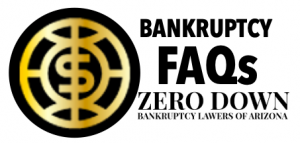ARIZONA ZERO DOWN BANKRUPTCY
Arizona Zero Down Bankruptcy FAQs

What is Bankruptcy?
Bankruptcy is a legal process that allows you to erase some or all of your debts. Common debts that can be discharged are credit card debt, medical bill debt, registration loans, payday loans, unsecured debt, and personal loans. Additionally, you may even be able to discharge some taxes and junior mortgages. However, not all debts can be included in a bankruptcy. Student loans and familial obligations like child support likely won’t be discharged in your bankruptcy. Also, once your debts are discharged, you are no longer obligated to pay them.

How can Bankruptcy help me?
Bankruptcy protections start as soon as you retain an attorney. Retaining procedures vary by office, but you can refer your creditors to your attorney as soon as you have hired them. Your creditors aren’t allowed to call you after you have informed them that you have a bankruptcy attorney.
Once you file your petition, you will be protected by The Automatic Stay. The Automatic Stay is active until your case is discharged or dismissed. When you are protected by the automatic stay, your creditors can’t garnish your wages, foreclose your home, or repossess your vehicle.

What is an Arizona Zero Down Bankruptcy?
Many Phoenix bankruptcy attorneys require you to pay the court filing fee and their entire legal representation fee before your case is filed. Our office offers $0 down payment plans for qualifying individuals filing Chapter 7 bankruptcy. Our plans can extend as long as 12 months post-bankruptcy. You can choose monthly, bi-weekly, or weekly payments and you choose the payment plan start date (within 30 days after your bankruptcy is filed). Your payments will be credit reported, helping you rebuild your credit score faster.

Can I keep my home if I file Bankruptcy?
If you file a Chapter 7 bankruptcy, you will be able to keep your home if you don’t have more equity in it than your state’s exemption limit. In Arizona, the exemption limit for a house is $150,000.
If you have more than $150,000 equity in your home, you can file a Chapter 13 Bankruptcy instead. Chapter 13 is also your best option if you are behind on your mortgage payments. The past-due balance will be included in your plan and spread out over 3-5 years.

What about my car? Can I keep that in Bankruptcy?
There are also Chapter 7 exemption limits for your vehicle/s. If you are a single filer, the exemption limit is $6,000 in one vehicle. If you are married, the exemption is $6,000 each in two vehicles, or $12,000 in one vehicle. You can file a Chapter 13 if you have too much equity in your vehicles.
You can utilize a Chapter 13 to catch up on back vehicle payments over 3-5 years and avoid repossession. However, unlike with mortgages, not only the past-due balance will be calculated into your plan. You will have to pay off the entire balance over the lifespan of your bankruptcy.

If I decide to file Bankruptcy, what do I have to do prior to filing?
Unless you want to file pro se, you will need to consult with attorneys before deciding which to retain. They will provide you with a list of documents you’ll need to submit to them in order to draft your petition. You will need to take an online credit counseling course before your case is filed. On the day of filing, you must have $300 or less in your bank account and cash on hand. This limit is raised to $600 for married couples. Once your attorney has prepared your petition, they will meet with you to review and sign the petition. The attorney will file the case for you electronically.

Do I have to list all of my creditors? I want to keep one credit card.
You don’t get to pick and choose which creditors will be included in your bankruptcy. All of your creditors must be included. However, if there is a specific credit card you’d like to keep, they may let you continue using their service if you choose to pay off your balance after your bankruptcy is discharged.

What is a bankruptcy discharge?
A discharge is the successful completion of a bankruptcy case. When your debts are discharged, it means you are no longer legally obligated to pay them. Your creditors can no longer pursue collection or report negatively towards your credit score. For both chapters of bankruptcy, you will need to complete two credit counseling courses and attend your Meeting of Creditors before your case can be discharged. In a Chapter 13, you will also need to complete your payment plan.

Can filing bankruptcy cause me to be evicted?
Unless you intend to break the lease and discharge any expenses associated with that in your bankruptcy, your landlord won’t be notified when you file. You can’t be evicted for filing bankruptcy. Potential landlords will see your bankruptcy on your credit check, but our office can provide a letter explaining how long they are protected from you discharging debts to them through bankruptcy. You will have to wait 2 years after a bankruptcy to qualify for a home loan.

What happens to my utilities when I file?
You must remain current on all utilities you want to keep using. If you are behind on any of your utilities, you can include the past-due balance in your bankruptcy- but they may decline to provide you service if you do so. Even after your debt is discharged, they may require you to pay off your balance before they resume service. Keep this in mind when discharging utilities such as electricity, because you often won’t have a choice of provider in the future.

Can I keep my House in a Chapter 7 Bankruptcy?
The homestead exemption in Arizona is $150,000. You should consult with an attorney if you have over $150,000 equity in your home but otherwise qualify for a Chapter 7. You can also retain any active rental lease. Staying within the these parameters, you can keep your home in a Chapter 7 Bankruptcy Filing in Arizona.

Can I keep my car if I file Chapter 7 Bankruptcy?
Whether you own your car outright or you are making payments, there are limits on how much equity you can have in your car. In Arizona as a single filer, you can own a car outright worth up to $6,000, or have $6,000 equity in a vehicle. Married filers may have two vehicles worth $6,000 each or one vehicle worth $12,000. There are special higher exemptions for filers with disabilities that need wheelchair-accessible vehicles. Following these parameters, you can keep your car in a Chapter 7 bankruptcy in Arizona.

How Much Does it Cost to File Bankruptcy in Arizona?
In Arizona, you must file paperwork in the U.S. bankruptcy court. This can be done with or without an attorney. Regardless, there is the cost of the filing fee to fie for bankruptcy in Arizona. The Chapter 7 Bankruptcy Filing Fee in Arizona is $335. The Arizona Chapter 13 Filing Fee is $310.

Will I be able to get credit after filing bankruptcy?
Filing bankruptcy in Arizona does not prevent you from getting new credit. As a matter of fact, there are many lenders who target freshly filed bankruptcy filers. Thus, right after a bankruptcy filing in Arizona, you can expect credit to be more difficult to get. However, credit is available. Usually the available credit is from large car dealers who want to sell you a car at their price. this is not always a great deal. Nonetheless, it is a good way to establish new credit. It may be worth a look for you if you have just filed bankruptcy in Arizona.
Another thing to keep in mind when looking into credit after filing bankruptcy is that Two years after a bankruptcy discharge, some debtors are eligible for mortgage loans. Although, some of the financing terms may not be as good as those who haven’t filed bankruptcy. It is possible to qualify for a home mortgage 2 years after filing for bankruptcy in Arizona. A home mortgage is an excellent way to improve your credit on the heels of filing bankruptcy.
Your bankruptcy filing stays on your credit for 10 years, however, it becomes less significant the further in the past the bankruptcy is. In fact, you are probably a better credit risk after your bankruptcy than before when you owed all that money. Contact an experienced bankruptcy attorney in Phoenix if you are trying to improve your credit after a bankruptcy.

Can I Discharge Alimony or Child Support in a bankruptcy in Arizona?
In Chapter 13 Bankruptcy, support is a top priority claim, by law, which must, be paid entirely over the lifetime of the Chapter 13 plan. Support has a greater concern than even taxes. The automatic stay shields you from all creditor action to obtain again debts while you suggest and also do on a Chapter 13 bankruptcy repayment plan. (Of note, a Chapter 13 bankruptcy repayment plan lasts 3-5 years.)
Oftentimes, the economically stressed loved one who must be spending support cannot for reasons of job loss, etc, illness. The largest mistake the non paying party is able to make is not trying to obtain the court ordered support improved to suit the present circumstances. The current order is going to control what’s owed each month, forever and now, until it’s modified. It’s practically impossible to obtain a court to retroactively change a support order, or perhaps to find any governmental organization collecting again support to compromise.
Thus, if circumstances have been changed and you actually cannot spend at the ordered level, return to court to obtain it changed. Sticking the head of yours in the sand on this particular matter is an error in judgment that is going to follow you for a long time until paid. If you are facing overwhelming debt, you should contact our Phoenix Bankruptcy Attorneys and Arizona Debt Relief Lawyers for a Free Consultation.

Can back taxes be discharged in bankruptcy?
Bankruptcy can provide relief from some taxes. Whereas, some taxes are completely discharged in a Chapter 7 bankruptcy. Whereas, taxes and penalties that are not able to be discharged can be paid back in a Chapter 13 Bankruptcy Repayment plan. In a Ch 13, these charges are paid back without interest.
Once bankruptcy is filed, the automatic stay stops all collection actions. including garnishments, collections, levies, and seizure. These provisions of the law apply equally to state and federal tax agencies.
PHONE
602-609-7000
HOURS:
Monday-Thursday 8:00 AM – 7:00 PM
Friday: 8:00 AM – 6:00 PM
Evening and Weekend hours available by appointment
EMAIL
[email protected]





